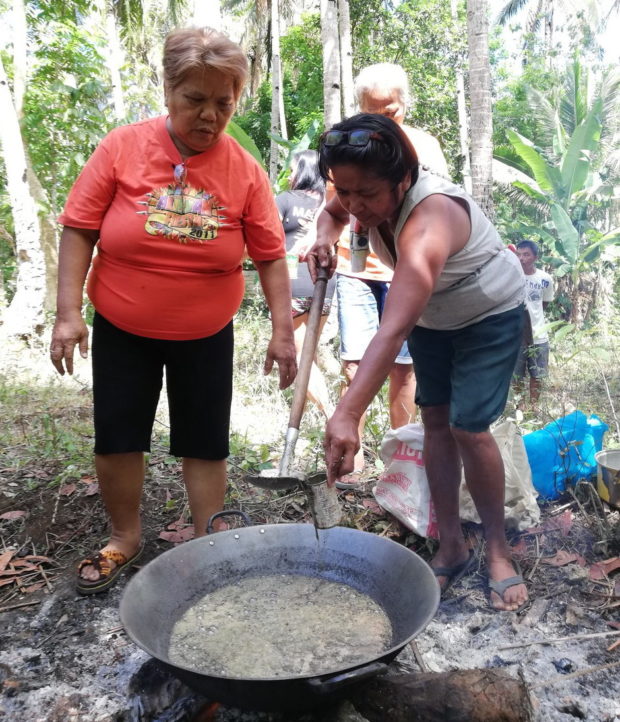Siquijor’s healing festival no match for COVID-19

POTION MAKERS Rosalinda Miranda (left), a faith healer from Mindanao, is shown in this photo, taken during Black Saturday last year, collecting “sumpa” (antidote) that her fellow folk healers and herbalists brewed in Siquijor town. —LEO UDTOHAN
TAGBILARAN CITY, Bohol, Philippines —For the first time in 22 years, faith healer Rosalinda Miranda will not visit Siquijor province this Holy Week.“There is no more boat available to bring me to Siquijor,” said Miranda, 60, who lives in Surallah town in South Cotabato province.
Miranda, in a phone interview, said she had been going to Siquijor every Holy Week since 1998 when she became a faith healer.
Typically on Palm Sunday, Miranda and fellow faith healers and occult practitioners from the Visayas and Mindanao would gather in Barangay San Antonio in Siquijor town to make potions and concoctions through the Holy Week, the year’s most somber period of prayer, penitence and reflection on the ultimate sacrifice of Jesus Christ.
Health emergency
Like many other events and celebrations, the gathering had been canceled due to the new coronavirus disease (COVID-19) pandemic.
The provincial government of Siquijor had canceled the staging of the Healing Festival on April 8 to April 11 at Mt. Bandilaan National Park due to the national public health emergency
Article continues after this advertisementThe festival, which started in 2006, would have gathered traditional faith healers and herbalists who practiced several styles of healing.
Article continues after this advertisementMiranda said she asked Siquijor-based faith healers to set aside herbs for her since she might be able to visit the island in June or July.
She said potions were not as potent if plants and herbs used in these concoctions did not grow in Siquijor.
“These medicinal plants are proven effective and potent compared to my hometown in South Cotabato,” she said.
Miranda said the healing environment of Siquijor helps her “renew” her “powers.”
Tradition
But the pandemic would not stop a known family of healers in Siquijor from following their Holy Week tradition.
Luz Ponce, 53, said they had been scouring the forest of Siquijor for the “pangalap,” the annual search for healing herbs for seven Fridays during Lent. It would culminate on Good Friday and Black Saturday.
They had to gather at least 3,000 kinds of medicinal plants including those found in the seas.
“Dili man dapat undangon ang tradisyun (We should not stop tradition),” Ponce said.
Her husband, Virgilio, comes from a family of “mananambal,” or faith healers on the island of Siquijor.Their patriarch, the late Juan, passed down the craft he learned from his own father to his children who considered healing as a vocation or calling.
On Black Saturday, the family would chop herbs and mix the brew for “sumpa” (antidote).
No visitor
The Ponces used to allow outsiders to join the ritual. On Black Saturday, however, the family decided to limit the event’s attendance to its members as they were not expecting visitors, Ponce said.
Faith healers in Siquijor produce medicinal herbs in their backyards, with some making potions in caves.
The island province of Siquijor in Central Visayas has 90,000 residents. It is the third smallest province in the country with only six municipalities—Larena, Enrique Villanueva, Lazi, Maria, San Juan and the capital Siquijor.
Its native name was Katugasan, after the “tugas” (molave) tree that grew on the island.
The Spaniards first called it “Isla del Fuego” (Island of Fire) due to the swarm of fireflies they found here.
In spite of the presence and practice of Christianity, witchcraft exists in various forms on the island, with Barangay San Antonio in Siquijor town known as the center of shamanism.
For more news about the novel coronavirus click here.
What you need to know about Coronavirus.
For more information on COVID-19, call the DOH Hotline: (02) 86517800 local 1149/1150.
The Inquirer Foundation supports our healthcare frontliners and is still accepting cash donations to be deposited at Banco de Oro (BDO) current account #007960018860 or donate through PayMaya using this link.